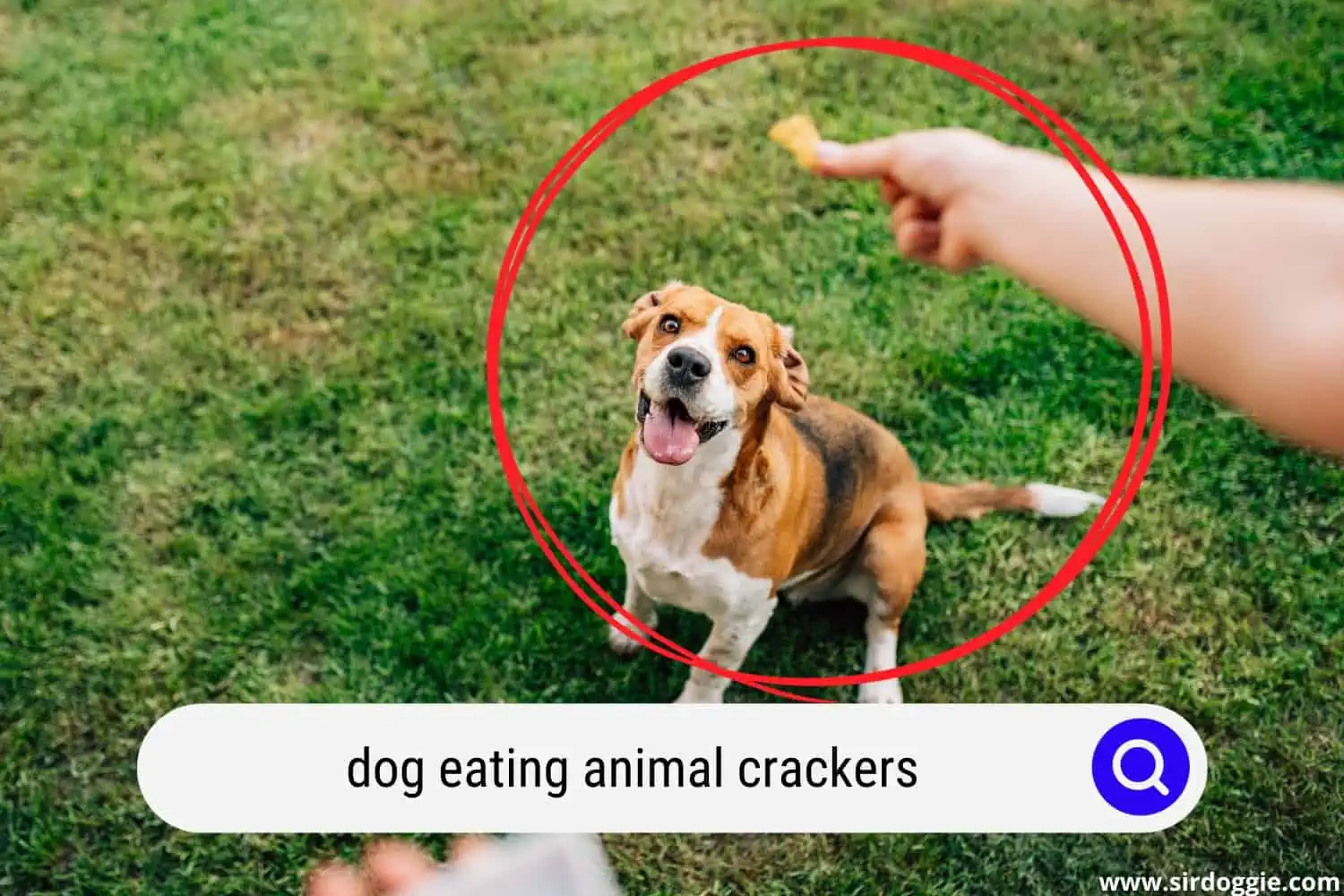Can Dogs Have Animal Crackers? (A Detailed Explanation)
When it comes to us humans, animal crackers may be a delightful and nostalgic treat, but they are not the best option for a snack to give to our canine companions too. If your dog is staring at you with his mouth open and salivating everywhere, what do you do? Is it best for you to just keep these tasty animal crackers all to yourself, or can you share them with your canine companion?
If your dog is pouting and begging and desperate to try your delicious snack, it’s best that you know the answer to this common pet owner question: “Can dogs eat animal crackers?”

Unfortunately for them, the answer is no. Dogs should not consume animal crackers since they contain high levels of sugar, sodium, calories, oils, carbs, and other harmful ingredients like artificial sweeteners and spices.
If you really must, you can safely give your dogs just a couple of plain animal crackers as a special treat on rare occasions. However, especially when there may be a chance of sharing with your dog, always be sure that the animal crackers you choose are plain and do not include any chocolate or sweeteners (such as xylitol) before you buy them as these can be harmful to your furry loved one.
Although animal crackers are relatively harmless in the short term, they may be very harmful to your pet in the long run.
This article explains to you what exactly animal crackers are made of, why these ingredients are important when it comes to your dog, and also some FAQs for those with more questions. Read on to find out everything you could want to know about this tasty and potentially pet-risky treat.
Related Reading: Can Dogs Eat Hummus? (Detailed Explanation)
What are the main ingredients of animal crackers?
Every package of animal crackers will typically include the same fundamental components, regardless of brand. Animal crackers are essentially just flat biscuits comprised of flour, sugar (or corn syrup), water, hydrogenated vegetable oil, baking soda, soybean oil, salt, and lecithin—plus a few more ingredients, such as an emulsifier. In terms of ingredients, they are more or less the same as regular cookies, just with the addition of some extra fat and carbohydrates.
Let’s take a closer look at each of these often-used substances one at a time.
Flour
All-purpose flour—or any other type of wheat flour—will almost certainly be one of the primary ingredients in your animal crackers. Flour is extremely high in carbohydrates and delivers far more carbs than any dog could require.
If your dog eats an excessive amount of carbohydrates, just as we humans do, it can result in weight gain and other health concerns for your pet. While eating a few animal crackers may not result in significant weight gain in a human, dogs cannot tolerate the same quantity of carbohydrates and may acquire weight more quickly.
Weight gain in dogs can be dangerous to their health. So, ultimately, we are spoiling our pets in a bad way by providing them with goodies that are high in carbohydrates and could lead to weight-related health problems in the future.
Sugar
The high sugar level in animal crackers is one of the reasons people (and dogs) may find themselves craving the snacks. Sugar is something that humans may detect as being tasty, but it is also something that should be consumed with both knowledge and restraint. Dogs will not have the same level of awareness as people when it comes to this delectable element, and they may just as easily grow hooked to it just like humans due to its addictive qualities.
The dangers of eating too much sugar daily can be extremely dangerous to a canine’s health. Diabetes and weight gain are difficulties for both people and dogs when they consume excess sugar. However, because people are often considerably larger than dogs, the same amount of sugar will have an even more severe effect on a dog.
The normal nutritional requirements of a dog do not include refined sugars. If you give your dog a reward that contains refined sugars, there is no biological need for you to do so. It is best that you refrain from feeding your dog any human items that include sugar in any form to keep him healthy.
Remember that sugar may also be listed under a variety of different names these days, which is dangerous for both you and your dog if you’re unaware it’s what you’re eating. Look at the nutritional information on your package of animal crackers, and you may even notice that “sugar” isn’t listed anywhere. Other substances, such as high-fructose corn syrup, fulfill the same function as refined sugar but are just as dangerous as the refined sugars they replace.
Oils
Many types of oils are not suitable for dogs, one of which is soybean oil. Soybean oil usually is present in animal crackers. It is neither hazardous nor detrimental to dogs, yet it does contain more saturated fat than other vegetable oils, making it a good and cheap choice for cooking.
There are a variety of oils that are suitable for use with dogs, but soybean oil is not one of them. Soybean oil is also detrimental to dogs that are allergic to soy products. As a result, it is preferable to consider dog treats that are made with a safer oil option for their dietary needs rather than soybean oil.
Salt
Animal crackers, like the majority of manufactured goods for humans, will contain sodium chloride as an ingredient. Dogs’ bodies are not designed to eat salt in the same way that people’s bodies are, and their bodies cannot handle the same quantities that humans can. It is possible that if you feed your dog an excessive amount of animal crackers, the salt in them could induce dehydration, which will result in your dog becoming overly thirsty.
When your dog gets unusually thirsty due to this, your canine can get gastric issues if they consume too much water in reaction to dehydration. If this occurs, the stomach is in danger of moving forward and becoming a serious dog health concern.
As a result, gastric dilatation-volvulus—which looks like bloat—occurs. This is a dangerous condition that requires immediate medical attention and can be life-threatening. If you feel that your dog has gotten dehydrated and is drinking water at a pace that is not normal for him, it is recommended that you seek veterinary assistance as soon as possible.
Baking soda
Baking soda is not required in a dog’s diet, and many animal crackers may have baking soda in them since it is such a common baking ingredient. With this being the case, feeding your dog baking soda in any form is not a smart idea. The majority of dogs that consume a small amount of baking soda should be alright, but if your pup eats an enormous amount of baking soda-containing animal crackers, a trip to the veterinarian may become compulsory.
Preservatives and chemical additives

It would not be unusual for your animal crackers to also have additional preservatives in addition to any natural ones—after all, they are processed goods. These compounds are used to extend the shelf life of the crackers while also intensifying and addictively flavoring the crackers’ taste and texture.
However, the evidence demonstrating a relationship between preservative use and health concerns (such as cancer) is becoming more evident for both humans and dogs. Processed animal crackers should be avoided at all costs for the sake of the health of your canine companion.
Artificial sweeteners
If your dog is consuming a package of sugar-free animal crackers that have been sweetened with an artificial sweetener, this may also be highly harmful to your dog. While all forms of sugar or its replacements should be avoided, artificial sweeteners should be avoided the most.
The sweetener most often used in animal crackers is called “xylitol,” and it has the potential to cause acute liver damage in your dog. This type of liver damage can be fatal, and it can happen in a very short period. Teeth-whitening products—such as toothpaste and chewing gum—are the top products containing xylitol, followed by animal crackers. You should be sure to never give your dog any foods that include this potentially lethal artificial sweetener.
Other risks
Another significant concern is the possibility of gastrointestinal blockages that exist if your dog consumes a whole package of animal crackers—because dogs get into things, and this type of situation can occur with any treat they can’t resist. This can result in severe gastrointestinal distress and obstruction, so try to avoid giving animal crackers to your canine companions when at all possible. Instead, if they’re tired of their regular dog treats, provide them with any organic other human treat such as apple slices, etc.
What should you do if your dog accidentally consumes a large amount of animal crackers?
Try to avoid giving your dog animal crackers as much as possible, but if your dog insists, an occasional cracker as a treat won’t be fatally harmful. However, remember to never feed them animal crackers regularly.
If you are concerned about your furry companion being having an upset stomach, you should try taking him outside until the extra food has been eliminated from his system. Make him feel as relaxed as possible as the meal is being processed while you wait for him to finish digesting and expelling it. For the next 8-12 hours, refrain from giving any food or water to your canine companion to let his system clear out.
FAQs
Is it safe for canines to eat animal crackers consistently?
Try to avoid giving your dog animal crackers as much as possible, but if your dog insists, an occasional cracker as a treat won’t be fatally harmful. However, remember to never feed them animal crackers regularly.
If your dog unintentionally consumes a couple of them, he will be safe in the short term. However, giving your dog these sweet, carbohydrate-rich biscuits regularly can be detrimental to his long-term health.

Can canines eat frosted animal crackers?
Frosted animal crackers typically have the same ingredients as regular animal crackers, just with a significant increase in food dyes and the amount of sugar thanks to the frosting and sprinkles, so they are still not a healthy snack for them to consume regularly.
Frosted animal crackers are extraordinarily heavy in calories, sugar, and harmful fats, so they should be avoided at all costs. With these having even more dietarily undesirable components, you should most definitely not allow your dog to consume them.
Can dogs consume chocolate animal crackers?
No, they cannot, even though a single chocolate animal cracker is unlikely to contain enough chocolate to harm your dog. The best idea is to just keep them out of reach of your pet because animal crackers of any sort may cause an upset stomach in your dog. Additionally, they contain far too many calories for your dog to consume on a balanced diet.
Is it okay for dogs to eat organic animal crackers?
As long as the organic animal crackers have fewer calories and a lower sugar content by comparison to conventional animal crackers, they may be okay for your dog to consume in limited amounts on rare occasions.
Related Reading: Can Dogs Eat Raw Bacon? (Detailed Explanation)

Family Dog Expert Author
Hi there! I’m Stuart, a devoted dog lover and family dog expert with over a decade of experience working with our furry companions. My passion for dogs drives me to share my knowledge and expertise, helping families build strong, loving bonds with their four-legged friends. When I’m not writing for SirDoggie, you’ll find me hiking, playing with my beautiful dog, or studying music.